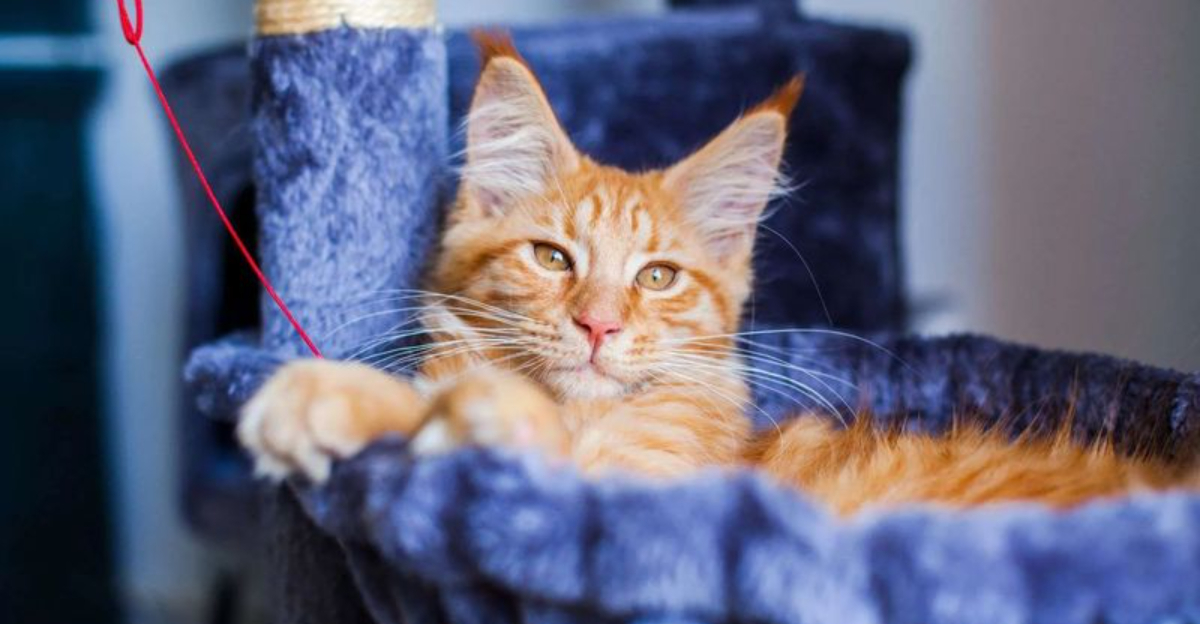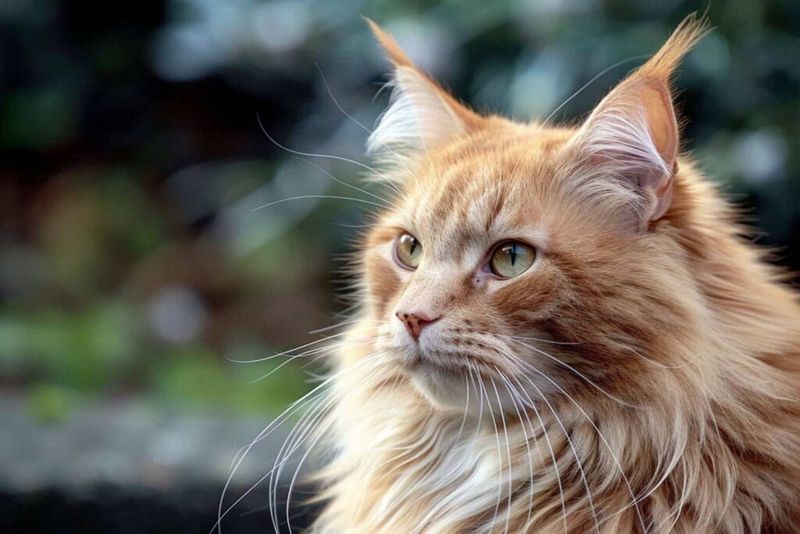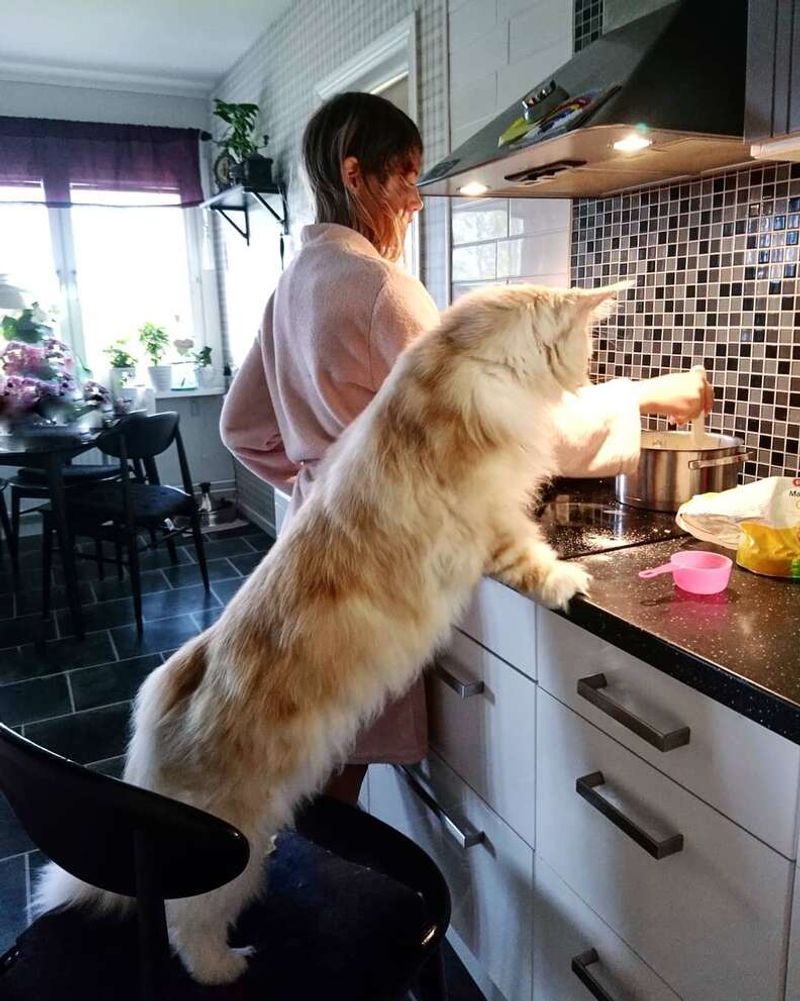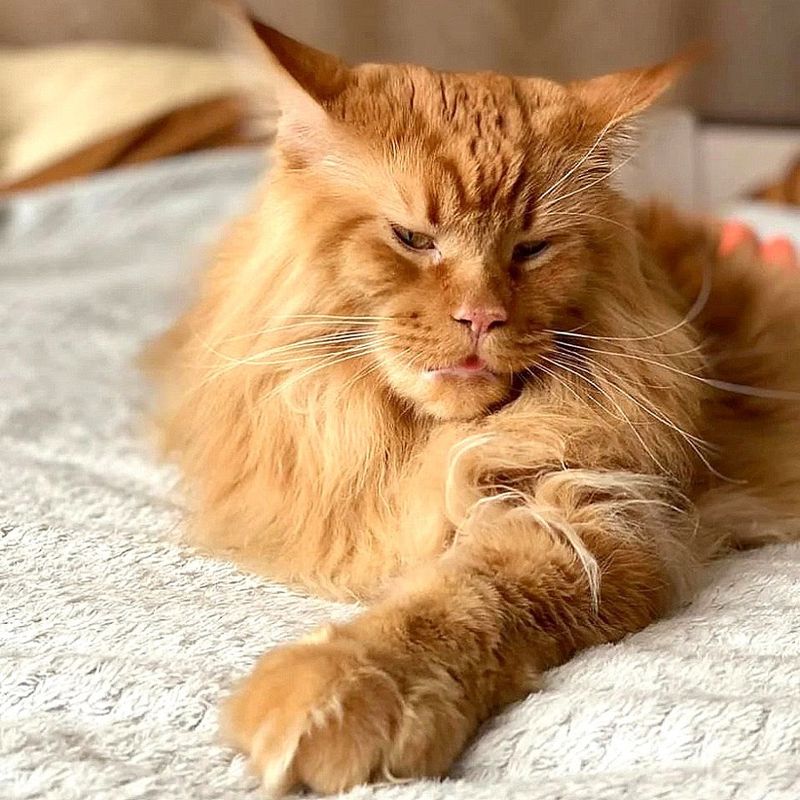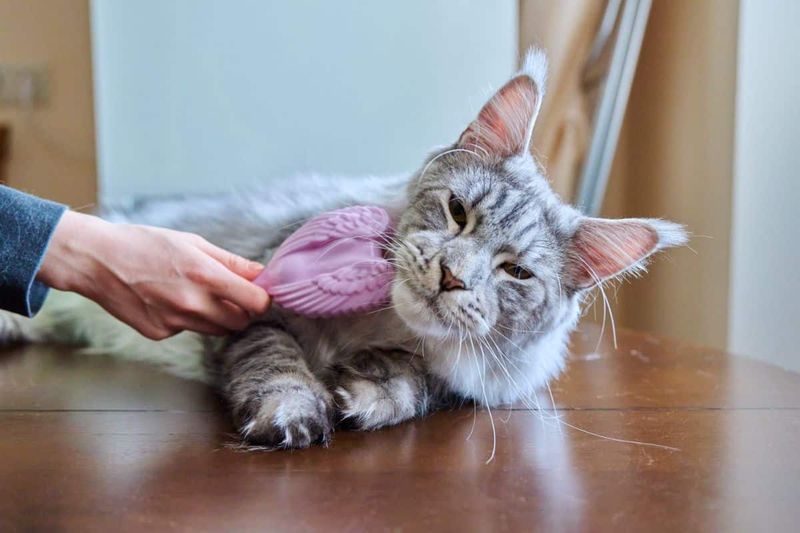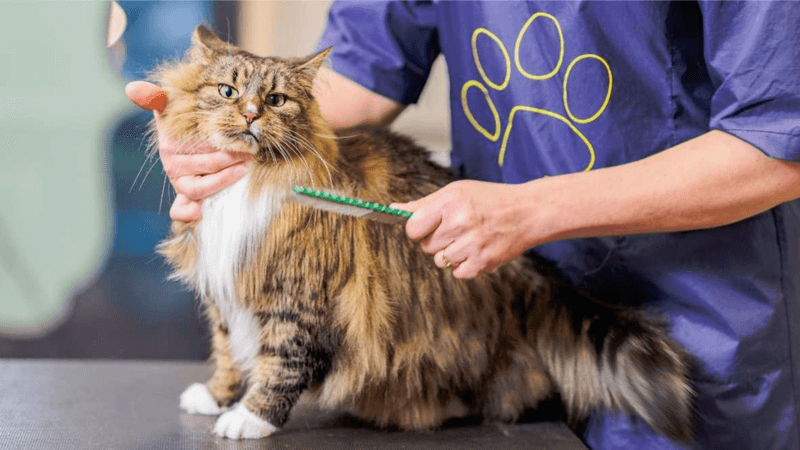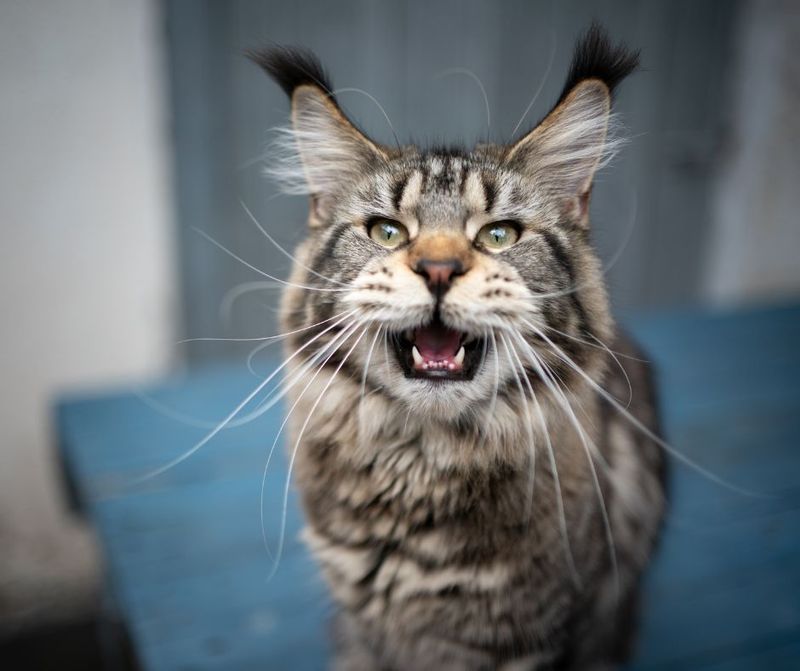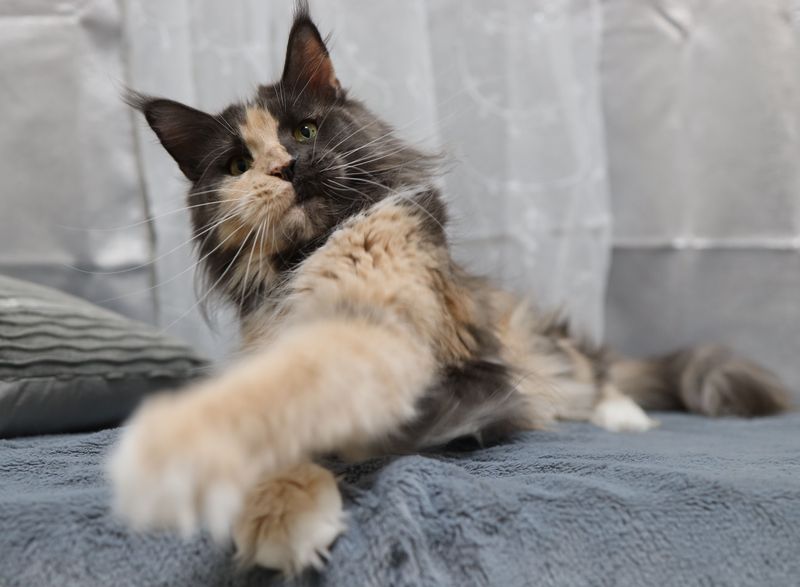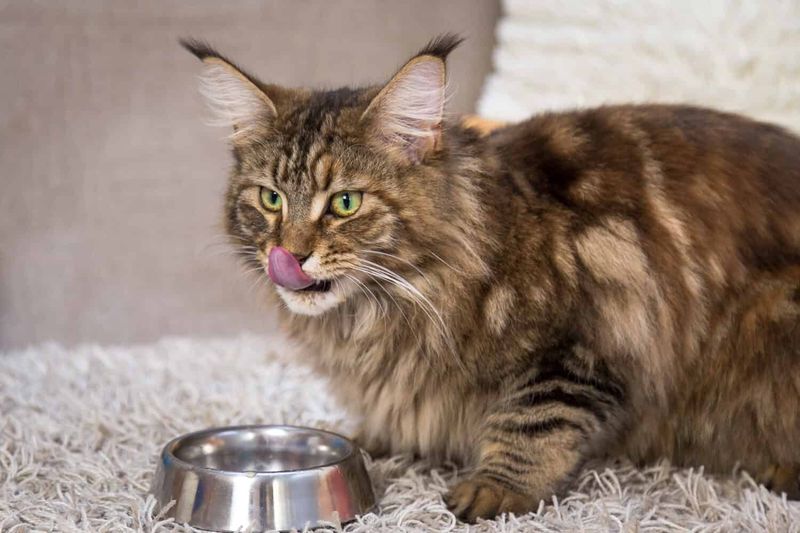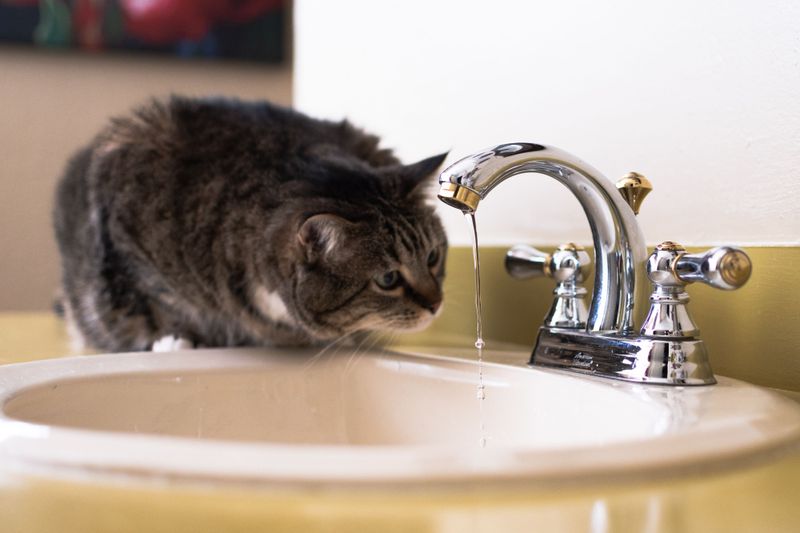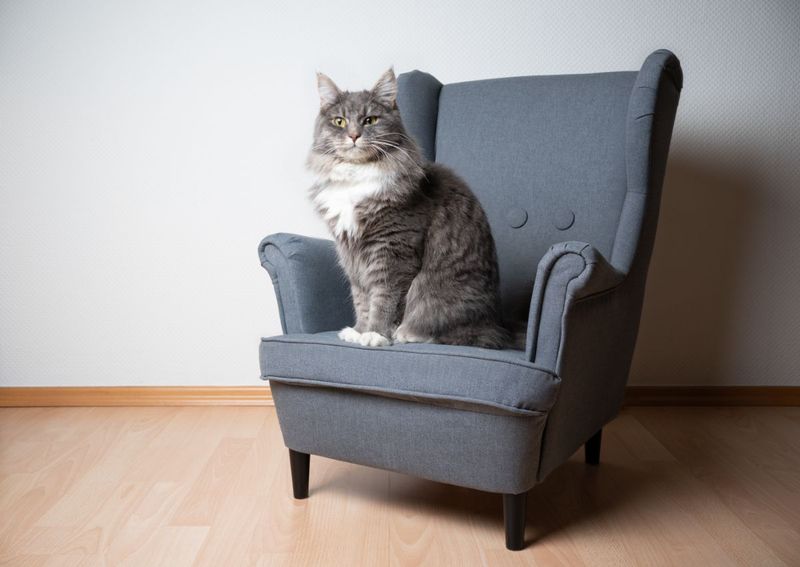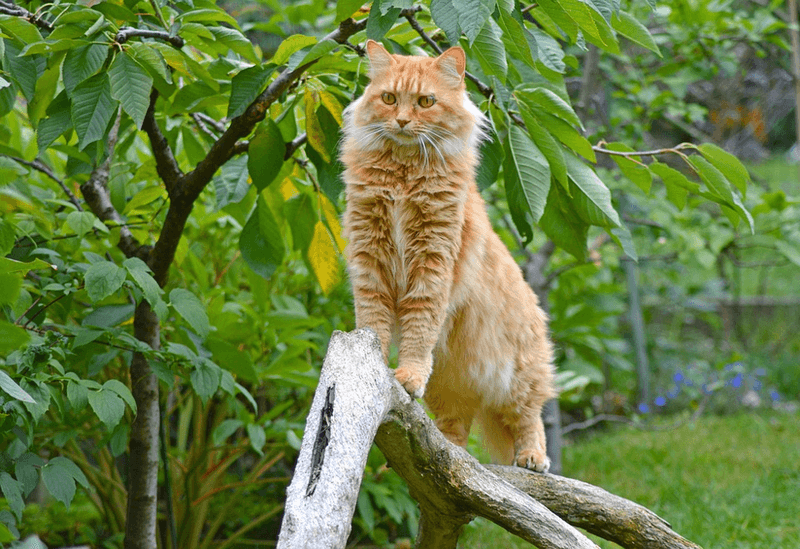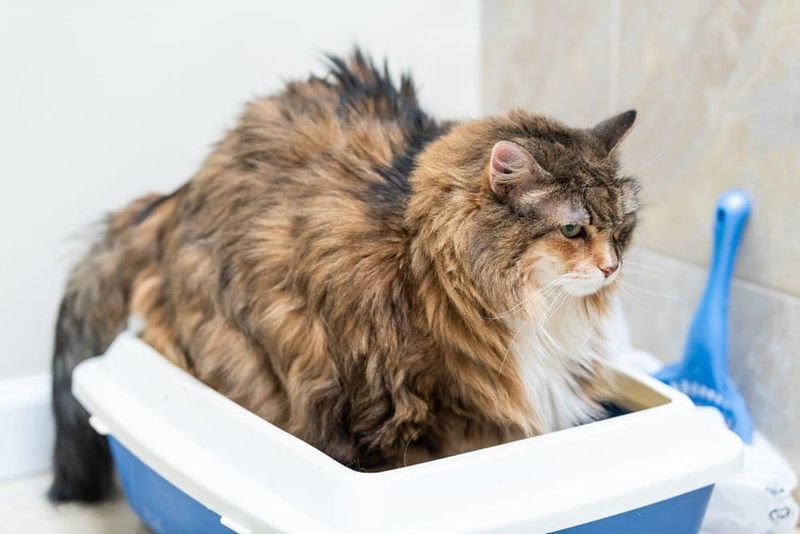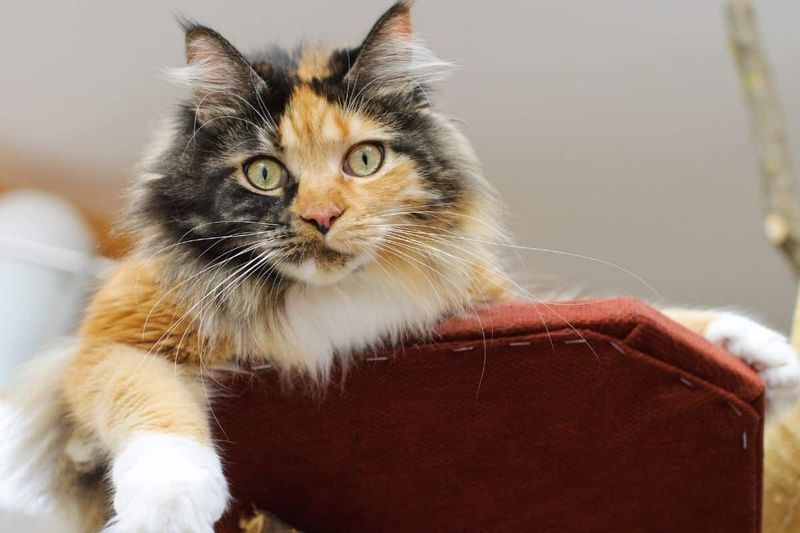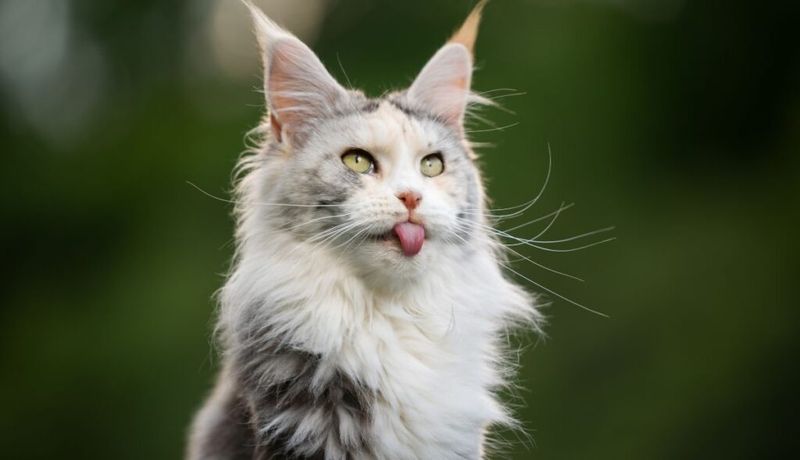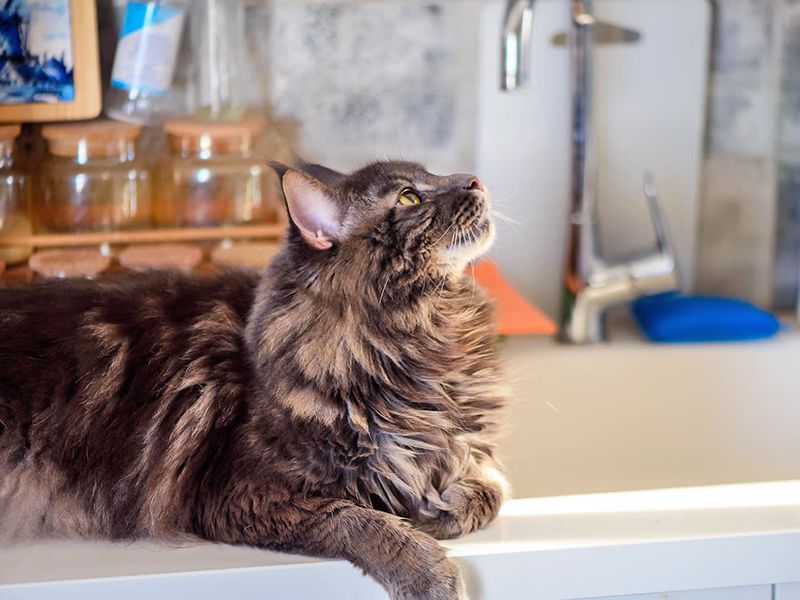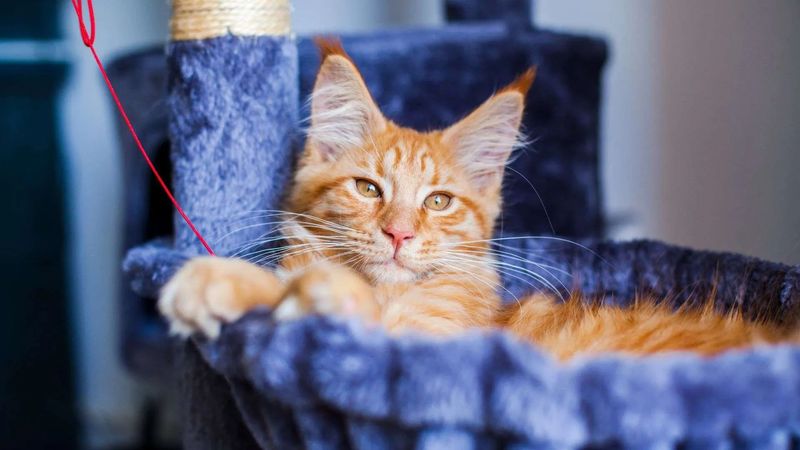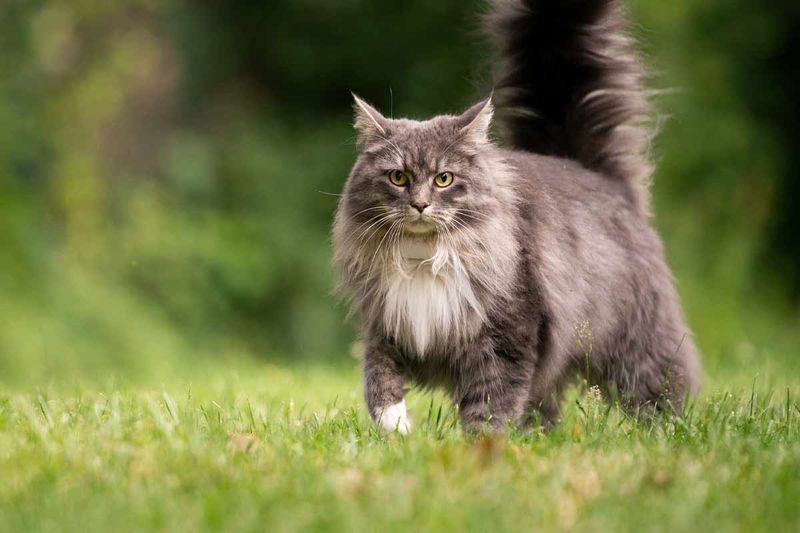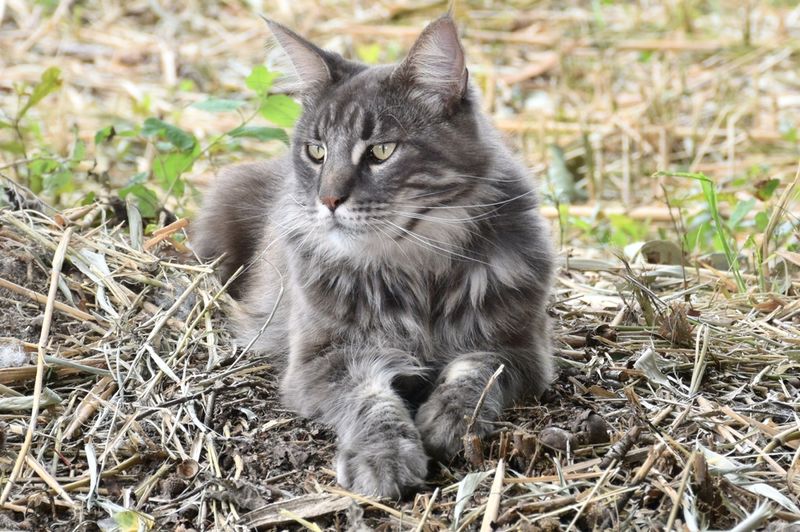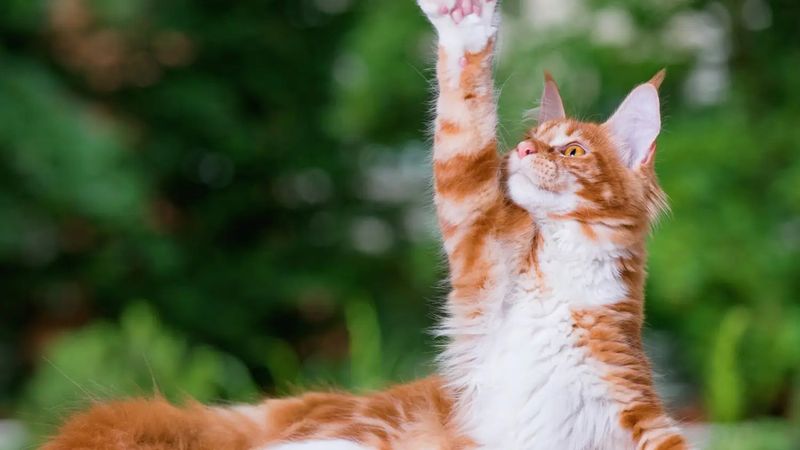📖 Table of Content:
- 1. Hefty Price Tag
- 2. Space-Hogging Giants
- 3. Fur Everywhere, Always
- 4. Demanding Grooming Routine
- 5. Genetic Health Concerns
- 6. Surprising Vocalization
- 7. High Intelligence Demands Engagement
- 8. Substantial Food Costs
- 9. Water Fascination Creates Mess
- 10. Climbing Tendencies Damage Furniture
- 11. Slow Maturation Process
- 12. Litter Box Logistics
- 13. Travel Complications
- 14. Veterinary Bills Add Up
- 15. Counter-Surfing Kitchen Thieves
- 16. Territorial Marking Issues
- 17. Excessive Hunting Instincts
- 18. Lengthy Lifespan Commitment
- 19. Overwhelming Neediness
Maine Coons are known for their striking appearance and gentle nature. With their large size, fluffy coats, and expressive eyes, they often stand out as a favorite among cat lovers. However, looks can be deceiving when it comes to long-term care and commitment.
These cats have unique needs that go beyond the average feline. Their thick fur requires regular grooming to prevent matting and discomfort. In addition, their sociable nature means they may not thrive in households where attention is limited.
Potential health issues can also pose challenges for owners. Maine Coons are prone to certain genetic conditions that may lead to high veterinary costs. Considering these factors is essential before deciding to welcome one into the home.
1. Hefty Price Tag
Prepare your wallet for a serious hit. Maine Coons from reputable breeders can cost anywhere from $1,000 to $2,500 – sometimes even more for show-quality cats with champion bloodlines.
This initial investment is just the beginning. When you factor in specialized food, larger cat furniture, and bigger litter boxes, the expenses add up quickly.
For many families on a budget, this financial commitment makes Maine Coons an impractical choice compared to adopting from shelters where cats cost a fraction of the price.
2. Space-Hogging Giants
Maine Coons aren’t your average house cats – they’re the largest domestic cat breed, often weighing 15-25 pounds and measuring up to 40 inches in length. Your cozy apartment might suddenly feel cramped with one of these giants roaming around.
Their size means they need substantial territory to explore and climb. Standard cat trees often can’t support their weight, requiring specialized (and pricier) furniture.
Living in tight quarters? Your Maine Coon might accidentally knock things over simply by turning around in a small space.
3. Fur Everywhere, Always
The luxurious coat that makes Maine Coons so beautiful becomes your worst enemy during shedding season. Their thick, water-resistant double coat sheds constantly, with dramatic seasonal blowouts twice yearly.
Dark clothing becomes a magnet for light-colored fur. Expect to find hair in your food, on your furniture, and mysteriously floating through the air.
Even with daily brushing (which is absolutely necessary), you’ll still need to vacuum frequently. Those with allergies or an aversion to housekeeping should seriously reconsider this breed.
4. Demanding Grooming Routine
That magnificent coat requires serious maintenance. Maine Coons need thorough brushing several times weekly to prevent painful mats and hairballs. During heavy shedding seasons, daily grooming becomes necessary.
Their ear tufts, while adorable, collect dirt and need regular cleaning. Long-haired Maine Coons sometimes need help with hygiene in their hindquarters area – not a task for the squeamish.
Busy professionals or families without consistent time for grooming might find these requirements overwhelming. Neglecting this care leads to serious health issues and discomfort for your cat.
5. Genetic Health Concerns
This breed is genetically prone to various serious health issues. Among them, hypertrophic cardiomyopathy stands out as a potentially deadly heart condition frequently seen in Maine Coons.
Hip dysplasia, typically associated with large dogs, also appears in Maine Coons due to their size. Spinal muscular atrophy is another genetic concern that can affect mobility.
Responsible ownership means regular veterinary screenings and potentially expensive treatments. The emotional and financial toll of managing these conditions can be significant, especially when they develop in younger cats.
6. Surprising Vocalization
These cats are far more talkative than most might expect. Maine Coons use a mix of chirping, trilling, and soft squeaky noises, which can seem surprisingly delicate coming from such a large animal.
Many owners find their Maine Coons vocalize throughout the day and night. They’ll announce their presence, demand attention, or simply narrate their activities with their unique vocabulary.
For those seeking a quiet pet or living in noise-sensitive environments like apartments with thin walls, this constant commentary can quickly become a nuisance rather than an endearing trait.
7. High Intelligence Demands Engagement
Maine Coons possess dog-like intelligence that requires constant mental stimulation. Without adequate enrichment, they become bored and develop destructive behaviors like opening cabinets, turning on faucets, or dismantling household items.
Their problem-solving abilities mean childproof locks often prove ineffective. Many owners find themselves constantly outsmarted by these clever cats.
For households where everyone works long hours, this need for interaction and stimulation can become problematic. A bored Maine Coon will find ways to entertain itself – usually at your expense.
8. Substantial Food Costs
Feeding a Maine Coon strains grocery budgets significantly. Their large size means they consume much more food than average cats – sometimes double or triple the amount.
Quality nutrition becomes especially important due to their predisposition to heart issues. Premium cat food designed for large breeds costs substantially more than standard options.
Many Maine Coons develop food sensitivities requiring specialized diets. When you factor in treats and supplements for joint health, you’re looking at monthly food costs that rival feeding a small dog rather than a typical cat.
9. Water Fascination Creates Mess
Maine Coons have an unusual fascination with water. Many owners discover their cats splashing in toilets, batting at running faucets, or even joining them in the shower.
This water obsession creates constant puddles throughout the house. Electronics, books, and other water-sensitive items need protection from their aquatic adventures.
Keeping toilet lids closed and bathroom doors shut becomes a household rule. For those who prefer an orderly home without unexpected indoor “water features,” this breed’s splashy antics can become a daily frustration.
10. Climbing Tendencies Damage Furniture
With a strong urge to climb, Maine Coons frequently aim for the highest vantage points. Their weight, however, can turn fragile furniture into unintended casualties.
Curtains become climbing ropes, bookshelves transform into mountain ranges, and kitchen counters serve as observation decks. Their powerful build enables them to reach places you never thought possible.
Homeowners with antiques or delicate furnishings face a particular challenge. Even with appropriate cat furniture available, many Maine Coons still prefer exploring prohibited areas, leading to costly repairs and replacements.
11. Slow Maturation Process
Unlike most cats that mature within a couple of years, Maine Coons can take up to 4–5 years to fully grow. This prolonged development means their playful and sometimes chaotic kitten behavior lasts much longer than expected.
Many owners grow frustrated waiting for their cat to “settle down.” Just when you think they’ve outgrown a troublesome habit, they find new mischief to get into.
This prolonged development also means their size increases gradually. That cute kitten you brought home will keep growing and growing, sometimes surprising owners with just how large their pet becomes.
12. Litter Box Logistics
Standard litter boxes simply don’t work for Maine Coons. Their large size requires oversized boxes that take up significant floor space in bathrooms or laundry rooms.
Even with proper-sized boxes, many Maine Coons still manage to kick litter everywhere. Their powerful digging instinct, combined with their size, creates impressive litter spray that extends far beyond the box.
Finding suitable locations for these giant boxes presents a challenge in smaller homes. The larger waste volume also means more frequent cleaning and higher litter costs – an ongoing expense many prospective owners fail to consider.
13. Travel Complications
Taking trips becomes complicated with a Maine Coon. Their size makes standard cat carriers uncomfortable or entirely too small, requiring specialized equipment for transportation.
Finding cat-sitters comfortable with their size can be challenging. Many Maine Coons form strong bonds with their owners and experience significant stress when left with unfamiliar people.
Air travel presents particular difficulties due to airline weight and size restrictions. Families who travel frequently may find the logistics of accommodating their Maine Coon’s needs creates additional stress and expense for every trip.
14. Veterinary Bills Add Up
Maine Coons require more specialized veterinary care than average cats. Their size means they need larger doses of medications and anesthesia, increasing the cost of routine procedures.
Many vets charge extra for handling larger cats. Dental cleanings, surgeries, and even nail trimmings come with premium pricing for these gentle giants.
Regular screening for breed-specific health issues like heart problems adds to the medical budget. Responsible owners should expect to spend significantly more on healthcare throughout their Maine Coon’s lifetime compared to other cat breeds.
15. Counter-Surfing Kitchen Thieves
Known for their sneaky side, Maine Coons have the size and agility to swipe food from nearly any surface. Standing on their hind legs, they can easily reach counters, tables, and even open fridge shelves.
Leaving food unattended becomes impossible. Many owners report their Maine Coons boldly stealing food directly from plates during meals.
This behavior proves difficult to correct due to their intelligence and determination. Households must adapt their food preparation and dining habits to prevent theft, adding an extra layer of inconvenience to daily routines.
16. Territorial Marking Issues
Male Maine Coons, especially unneutered ones, can develop significant territorial marking behaviors. Their urine contains stronger odors than smaller cats, making these marking incidents particularly problematic.
Even neutered males sometimes spray when stressed or when establishing territory. The larger size of Maine Coons means their spray can reach higher surfaces like walls and furniture.
Female Maine Coons aren’t exempt from this behavior. During heat cycles, unspayed females may also mark territory, creating persistent odor problems that prove difficult to eliminate completely from homes.
17. Excessive Hunting Instincts
Their deep-rooted hunting instincts remain sharp, even in domestic settings. With a background as working barn cats, Maine Coons may see small pets such as birds or rodents as prey rather than companions.
Many owners underestimate the predatory drive of these gentle-looking cats. Their size and strength make them capable of catching larger prey than average cats.
Homes with fish tanks face particular challenges, as Maine Coons often become obsessed with watching and attempting to access aquariums. Their problem-solving abilities mean they frequently figure out how to remove tank lids.
18. Lengthy Lifespan Commitment
With proper care, Maine Coons often live between 12 and 15 years, and some reach their late teens or early twenties. This longevity requires a serious long-term commitment that can span major life changes.
Career moves, relationship changes, and housing situations will all need to accommodate your feline friend for potentially two decades. The financial responsibility extends far longer than many owners initially calculate.
Their slow maturation combined with their lengthy lifespan means you’re signing up for what amounts to a 20-year commitment – longer than many marriages and most other pet relationships.
19. Overwhelming Neediness
Maine Coons develop intense bonds with their owners, often following them from room to room demanding attention. Their neediness can feel suffocating, especially for those accustomed to the independent nature of typical cats.
Many owners report their Maine Coons insist on participating in all activities – from cooking to showering to working from home. Privacy becomes a foreign concept with these cats around.
This clingy behavior intensifies when left alone for periods, sometimes resulting in destructive separation anxiety. Those seeking a low-maintenance pet that entertains itself will find a Maine Coon’s constant need for interaction exhausting.
